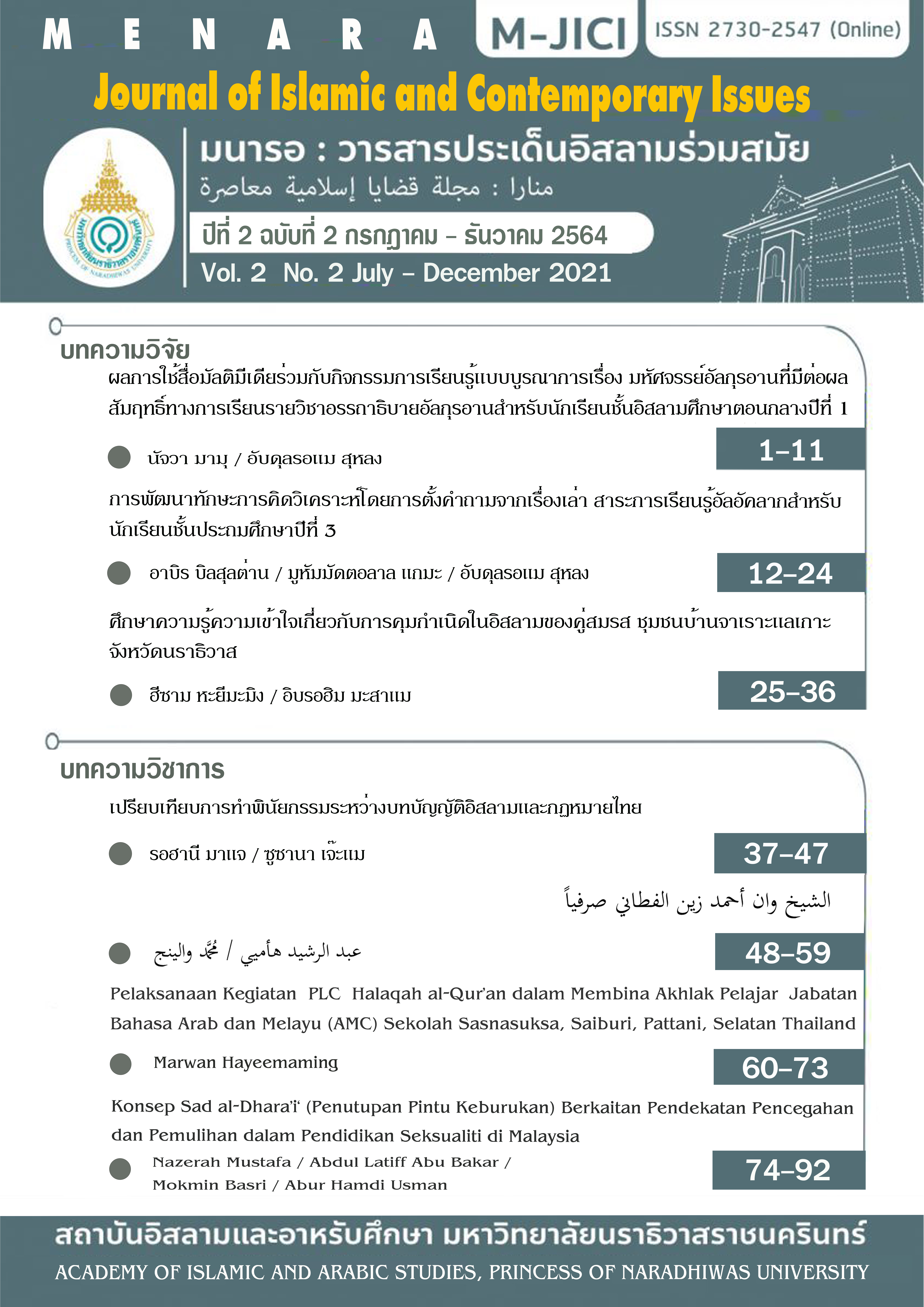Comparison of Wills between Islamic Law and Thai Law
Keywords:
Wills, Islamic law, Thai lawAbstract
This article aims to compare the wills between Islamic law and Thai law. This is a documentary research. The information and content of this article is based on primary document sources include document of Islamic Law and the Civil and Commercial Code. The results of this study show the wills between Islamic law and Thai laws. There is a corresponding parts: The meaning of the wills, the conferment of assets or assets to any person except, the heirs who have already inherited which will come into force after the death of the testator and the effect of the will is effective immediately. After the death of the testator and the difference is according to the Islamic law. Wills are granted after expenses have been paid on the funeral arrangements and debts have been paid. which is different from the Civil and Commercial Code that the will is effective and can be claimed immediately after the death of the testator without conditions or time conditions to be effective after claiming.
References
จารึก เซ็นเจริญ และ มุหัมมัด พายิบ. (ม.ป.ป.). นิติศาสตร์อิสลาม มัซฮับชาฟิ อี. กรุงเทพ ฯ: ส. วงศ์เสงี่ยม.
ทนงศักดิ์ หมาดทิ้ง. (2558). พินัยกรรมในอิสลาม ศึกษาการปฏิบัติจริงของมุสลิมในอำเภอเมือง จังหวัดสตูล. ปัตตานี: วิทยาลัยอิสลามศึกษา มหาวิทยาลัยสงขลานครินทร์ วิทยาเขตปัตตานี.
บรรจง บินกาซัน. (2547). สารานุกรมอิสลามฉบับเยาวชนและผู้เริ่มสนใจ. กรุงเทพฯ: สา นักพิมพ์อัล อะมีน.
บวรศักดิ์ อุวรรณโณ. (2548). คำอธิบายกฎหมายแพ่งและพาณิชย์ว่าด้วยมรดก. พิมพ์ครั้งที่ 2. กรุงเทพฯ: มหาวิทยาลัยธรรมศาสตร์.
เพียงพร วิเศษสินธุ์. (2555). กฎหมายอิสลามกับการจัดการมรดก : ศึกษาเฉพาะกรณีศาลจังหวัดสตูล. รายงานส่วนบุคคลของการอบรมหลักสูตร ผู้พิพากษาผู้บริหารในศาลชั้นต้น รุ่นที่ 10 สถาบันพัฒนาข้าราชการฝ่ายตุลาการศาลยุติธรรม สำนักงานยุติธรรม.
มุนีร มูหะหมัด. (2551). กฎหมายอิสลามเบื้องต้น. กรุงเทพฯ: บริษัทออฟเซ็ทจำกัด.
วรยุทธ์ อุเซ็ง. (2563). ศึกษาปัญหาและแนวทางแก้ไขการแบ่งมรดกตามบทบัญญัติอิสลาม: กรณีศึกษาผู้นำศาสนาชุมชนมุสลิม เขตเทศบาลเมืองนราธิวาส. วารสาร MENARA : Journal of Islamic and Contemporary Issues (M-JICI), 1(1), 43-52.
สมยศ เชื้อไทย.(2551). ประมวลกฎหมายแพ่งและพาณิชย์ ฉบับใช้เรียน. (พิมพ์ครั้งที่ 5). กรุงเทพฯ: วิญญูชน.
สมหวัง บินหะซัน. (2549). การใช้กฎหมายอิสลามลักษณะมรดกและพินัยกรรมในกรุงเทพมหานคร. วิทยานิพนธ์ศิลปศาสตร์มหาบัณฑิต สาขาวิชาอิสลามศึกษา มหาวิทยาลัยสงขลานครินทร์.
สมาคมนักเรียนเก่าอาหรับประเทศไทย. (ม.ป.ป.). คัมภีร์อัลกุรอาน พร้อมความหมายแปลภาษาไทย. อัลมะดีนะฮฺ อัลมุเนาวะเราะฮฺ: ศูนย์กษัตริย์ฟะฮัด เพื่อการพิมพ์อัลกุรอาน.
อิมรอน อาแว. (2560). ระบบบริหารจัดการในการแบ่งมรดกทั้งสังหาริมทรัพย์และอสังหาริมทรัพย์ตามหลักกฎหมายอิสลาม. วิทยานิพนธ์หลักสูตรปริญญาศาสตรมหาบัณฑิต สาขาวิชาการจัดการเทคโนโลยีสารสนเทศ. ปัตตานี: มหาวิทยาลัยสงขลานครินทร์.
อิสมาแอ อาลี. (2537). กฎหมายอิสลาม (ประวัติความเป็นมากฎหมายพินัยกรรม). ปัตตานี: วิทยาลัยอิสลามศึกษา มหาวิทยาลัยสงขลานครินทร์ วิทยาเขตปัตตานี.
Ithailaw. คนเสมือนไร้ความสามารถ. (ออนไลน์). แหล่งที่มา: http://ithailaw.blogspot.com/2011/04/blog-post_26.html, สืบค้นเมื่อวันที่ 15 กันยายน 2564.
เอกสารอ้างอิงฉบับภาษาอังกฤษ
Muslim Ibn Hajjaj. (1955). Sahih Muslim. Beirut: Dar Ihya al Turath al-cArabi.



